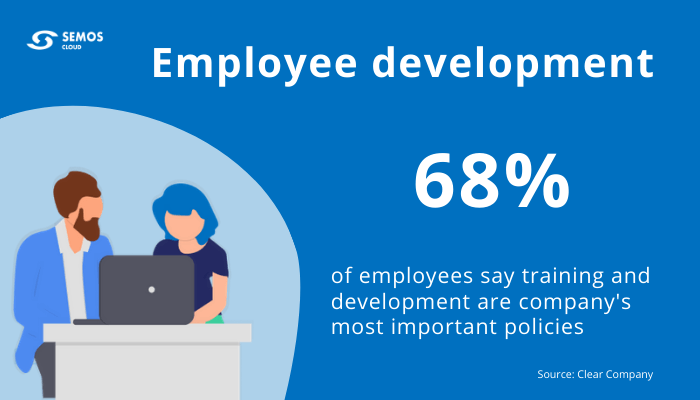The rise of remote working has changed the way many companies operate. While this year has seen some employees returning to the office, many workers are still working remotely part- or full-time.
Remote working has many benefits for workers, such as increased flexibility and, in some industries, greater productivity, but replacing the face-to-face office culture that is integral to so many businesses can be difficult with staff working remotely—though it’s certainly not impossible.
In this article, we’ll take a look at some implementable steps and initiatives that companies can take to promote a friendly and positive office culture among remote staff.
Let’s get started.
Photo by Charles Deluvio (Unsplash)
What challenges does remote working bring to ‘culture’?
The collaborative work and idea-sharing that thrive when employees work together in an office are tricky to replicate with employees working remotely.
Companies also face challenges when onboarding staff in a remote setting. In an office, a manager or supervisor will be on hand to help a new employee learn the new tasks they’re responsible for and walk them through their training period.
Virtual tools may facilitate clear communication and collaboration among colleagues, but it can still be difficult to replicate the natural relationships that employees can build when they work together in person every day.
Despite these challenges, with the right tools, team building initiatives, and trust from company leaders in their staff, there are plenty of ways companies can build and maintain their culture with remote working. Here are some of them:
#1 Be Communicative With Your Team
Arguably, the most critical step to building and maintaining a positive remote working office culture is to ensure clear communication between employees themselves and the interactions between company leadership and their employees.
There are plenty of ways team and company leaders can ensure clear communication with their staff, including:
- A daily stand-up between a team leader and their team to discuss work priorities.
- Weekly or fortnightly one-on-one meetings between a team leader or supervisor and individual team members to dig into employee performance and personal challenges
- Regular whole company or department meetings.
#2 Hold Regular Team-Building Events
Regular meetings are necessary to keep on top of employee and team workloads, but they are not always the best venue for building rapport. This is where regular team-building events come in. These events are vital to maintaining a positive culture in an informal, relaxed way, and they give employees and company leaders the chance to get to know each other personally, not just professionally.
Some of the most popular virtual team-building events to try out are:
- Friday happy hours on Zoom – where coworkers get together to enjoy a drink, just like they would if they worked in a physical environment together.
- Team quizzes – these can be particularly useful if your team is looking to get to know each other a little better.
- Multiplayer gaming sessions, there are tons of online games that team members can play together.
- Informal events – such as virtual poker, virtual cooking classes, music jam sessions, or other virtual activities.
#3 Clearly Communicate Your Company Values
The values your company holds should dictate how your employees carry out their work, interact with one another, and engage with customers.
Common company values include diversity in the workspace, accountability, respect for customers, teamwork, etc.
Creating and clearly communicating your company values with your staff is very important if they’re working remotely.
However, you don’t want to lecture your staff on your company values. Instead, for any new employees starting or interviewing at your company, you could outline your company values in the interview process or during their onboarding, or if you are just beginning to come up with a set of company values, seek input from your employees on what those values should be.
You can also encourage peer-to-peer recognition schemes between employees where an employee demonstrating one of your values is recognized.
For example, you could have a weekly or monthly competition where you ask each member of a team to nominate a peer who’s incorporated one of your company values in their work. A nomination could be for going above and beyond with a customer or helping out a fellow teammate.
#4 Send Monthly ‘Pulse Checks’ To Your Team To See How They Are Doing
An alternative to holding more formal weekly or monthly meetings with team members is to send members of your team a monthly pulse check to see how they are doing. This is particularly beneficial if you’re looking to gauge employee feedback, particularly for those employees who may not be comfortable sharing their concerns one-to-one.
A pulse check is a short survey, usually around five questions, sent via email where employees can share their feedback. Some example pulse check questions to ask are:
- How did you feel at work this month?
- Do you feel supported in your work?
- What achievements are you proud of this month?
- Are you happy with your remote working conditions?
- Do you feel like you have adequate opportunities to learn and develop your skills?
These questions should give you good insights into how your team members are feeling and how they are progressing with their work.
You can also do this for more work-related issues instead of hopping onto a cumbersome video conference every time you want to discuss something as small as a change in the sales funnel or an update on a client. Work-related questions could be simply:
- Have you checked up on client X lately?
- Have we delivered the ROI we needed on our SMS marketing campaign?
- Any updates on onboarding that new marketing team member?
- Any other simple questions that don’t need complicated video meetings.
#5 Ensure Your Staff Have An Adequate Home Office Space
If you’ve spent much time working remotely, you’ll already know the importance of having a clean, tidy workspace to work from. For employees to maximize their potential and carry out their work to a high standard, it’s essential that they have access to a good workspace, and employers should do all they can to support their employees with this.
Here are some things businesses should provide to each of their remote employees:
- A quality laptop.
- Extra monitors depending on their needs.
- An ergonomic chair that is comfortable to sit in for long periods.
- An adequate tech stack for easy communication and collaboration with other employees.
Regularly check with employees to see if there is any new office equipment or technology that would help them in their day-to-day work.
#6 Trust Your Employees
To work productively, employees need to feel trust when working remotely. Key to this is managers or team leaders not micromanaging employees and allowing them to get on with their work independently when needed.
Your employees should also trust you enough to raise any concerns that do spring up. Of course, it’s important to have processes in place to monitor and check the quality of your employees work, but this shouldn’t be to the detriment of manager/employee trust.
As we’ve already mentioned, having clear regular communication with employees, holding regular social events and being honest and upfront in your interactions will go a long way to building trust.
When it comes to work projects, try to clearly lay out roles and responsibilities to each team member, particularly new starters. If multiple team members are involved in a new project, try and set clear project deadlines that everyone agrees upon. You can also hold regular review sessions with your team to check how the project is progressing and whether the set deadlines will be met.
There are plenty of tools available to help keep your team on track including:
Communication tools such as Slack and Microsoft Teams
Project management tools such as Trello and Asana
#7 Put Employee Growth At The Heart Of Your Company Culture
There’s nothing worse for ambitious employees than feeling stifled in their career growth, but the good news is more and more companies are prioritizing upskilling, reskilling and career opportunities for their existing employees.
Recent research from LinkedIn highlights that 59% of learning and development professionals state that upskilling and reskilling is a top priority, while 51% agree that internal mobility for staff within an organization is a greater priority now than before Covid-19.
LinkedIn also points out that employees at companies with high internal mobility stay for an average of 5.4 years at a company, compared to an average stay of 2.9 years for employees at companies with low internal mobility.
It’s not just employees who benefit from a culture of career growth; organizations benefit too. By fostering a culture that prioritizes career growth for your employees, you’ll see less employee turnover, you’ll retain key staff who won’t leave at first sight of a better offer, and you won’t need to stress about constantly hiring new staff (unless your business is growing!).
Showing your employees that they matter can also really show them that you see them as valuable assets to your company.
Stats around employee churn highlight just how detrimental it can be to a companies finances, reputation, and recruitment metrics, but also how beneficial low employee churn can be:
- The average employee exit costs a company 33% of the employee’s salary.
- The average employee turnover for most companies is 19%.
- On average, companies with low employee turnover bring in four times higher profits than companies with high employee turnover.
- On average, it takes one to two years for a new employee to be fully competent in their new role.
Wrapping it up
Creating and maintaining a positive company or office culture when all your employees work remotely is tough and requires regular monitoring and upkeep.
In this article, we’ve laid out practical steps that you can take to help your employees in their roles while working remotely.
By prioritizing clear communication with your team, offering career growth opportunities for hard-working employees, trusting employees in their work, and ensuring remote staff has a comfortable home working environment – you’ll go a long way to fostering a positive office culture among your remote employees.
As workplace trends continue to evolve, there will be more opportunities to roll out new initiatives that you can adopt to further enhance your company culture. So don’t be afraid to test out new ideas or technologies as they become available, and always remember, your employees are your greatest asset!





